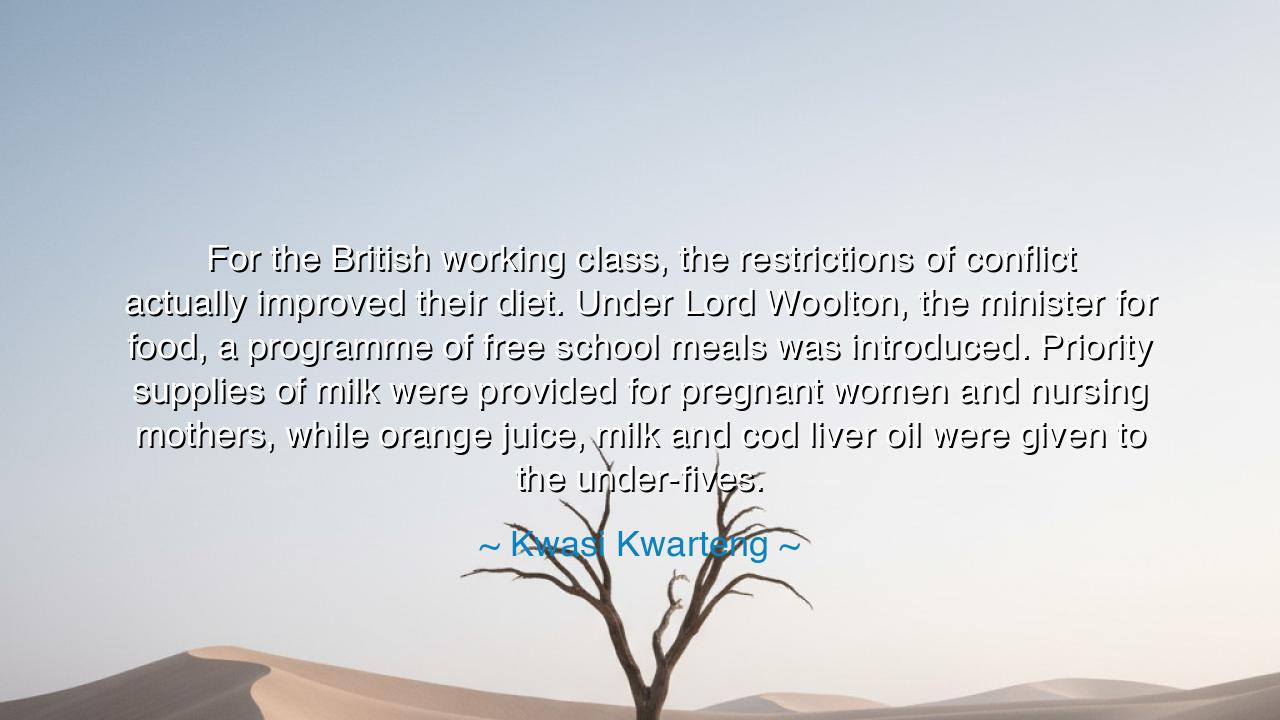
For the British working class, the restrictions of conflict
For the British working class, the restrictions of conflict actually improved their diet. Under Lord Woolton, the minister for food, a programme of free school meals was introduced. Priority supplies of milk were provided for pregnant women and nursing mothers, while orange juice, milk and cod liver oil were given to the under-fives.






The words of Kwasi Kwarteng—“For the British working class, the restrictions of conflict actually improved their diet. Under Lord Woolton, the minister for food, a programme of free school meals was introduced. Priority supplies of milk were provided for pregnant women and nursing mothers, while orange juice, milk and cod liver oil were given to the under-fives”—echo with the paradoxical wisdom of history: that even in the crucible of war, necessity can give birth to virtue, and from the ashes of destruction may rise the seeds of renewal. Though the fires of the Second World War consumed nations and hearts alike, they also forged unexpected good, as hardship compelled society to reimagine justice, compassion, and care.
When Kwarteng speaks of the British working class and the “restrictions of conflict,” he reminds us of a time when Britain stood both broken and unbroken. Food was rationed, luxuries vanished, and hunger walked among the people. Yet from these privations came an unforeseen grace: balance, discipline, and equity in nourishment. No longer could the wealthy feast while the poor starved; the war demanded unity not just in battle, but in the daily bread. Under the guidance of Lord Woolton, the government took upon itself a moral duty to ensure that even in scarcity, the weakest were not forsaken. Thus, the humble acts of distributing milk, orange juice, and cod liver oil became symbols of a nation’s shared endurance—acts of quiet heroism that nourished both body and soul.
The origin of this policy sprang not from luxury, but from suffering. Britain in wartime was a land of austerity, where every morsel was measured and every meal planned for survival. Yet in this grim order, there was wisdom—the wisdom of restraint. The wealthy were stripped of excess; the poor were granted access. Junk and indulgence were replaced with sustenance and care. Out of necessity was born nutritional justice, and through it, the working class found themselves healthier than they had been in peacetime. The war that took so much had, by strange design, given something back: a lesson in balance and the healing power of shared sacrifice.
History offers few ironies as noble as this. The ancients, too, understood that constraint can purify a people. In Sparta, where warriors lived on modest fare, simplicity forged strength. The philosopher Seneca once declared that “hunger is the seasoning of food,” meaning that deprivation sharpens both appetite and gratitude. So too, the British of that generation discovered that virtue and vitality do not come from plenty, but from purposeful scarcity—when every bite is valued, every drop of milk becomes sacred, and every act of nourishment becomes an act of national unity.
The story of Lord Woolton and his reforms is more than political history—it is moral allegory. He was not a man of grandeur, but of practicality and compassion, who saw that true victory in war required not just soldiers at the front, but strength in the hearth and home. By giving milk to mothers and cod liver oil to children, he strengthened the invisible army—the generation that would rebuild the nation once the guns fell silent. His work teaches us that leadership in dark times is not always about conquest or command, but about care, quiet and enduring.
This wisdom endures for our own age. In a time when abundance has returned, and yet malnutrition of body and spirit still abounds, Kwarteng’s reflection serves as a warning: plenty without purpose breeds decay. The modern world, with its excess of choice and its poverty of discipline, has forgotten the strange blessings of restraint. We have more food, yet fewer nutrients; more wealth, yet less health. The war generation, in their hardship, knew something we have lost—that community, fairness, and moderation are themselves forms of nourishment.
Let this be the lesson we inherit: adversity can purify what comfort corrupts. When life imposes limits, embrace them as teachers. When luxury tempts, remember the strength born of simplicity. Let governments and individuals alike learn that the measure of civilization is not in its feasts, but in how it feeds its weakest.
So, as Kwasi Kwarteng reminds us, even in conflict there can be compassion, and in scarcity, salvation. Let us live, then, with gratitude for our abundance, but with the discipline of those who endured without it. For the heart of a nation—or a soul—is not forged in plenty, but proven in restraint.






AAdministratorAdministrator
Welcome, honored guests. Please leave a comment, we will respond soon